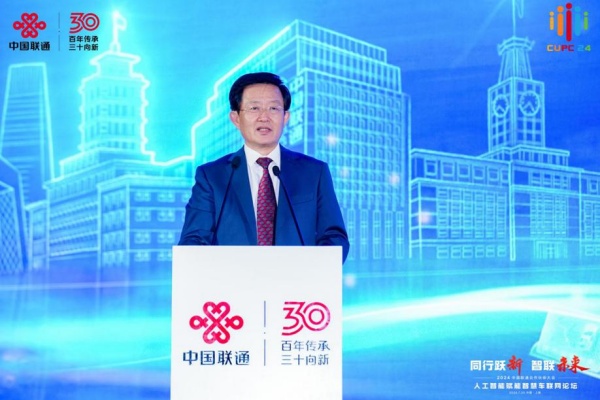
- Home
- Media Center
-
Events
- Wuzhen Summit
- Regional Forums
- Practice Cases of Jointly Building a Community with a Shared Future in Cyberspace
- World Internet Conference Awards for Pioneering Science and Technology
- The Light of Internet Expo
- Straight to Wuzhen Competition
- Global Youth Leadership Program
- WIC Distinguished Contribution Award
- Membership
- Research & Cooperation
- Digital Academy
-
Reports
- Collection of cases on Jointly Building a Community with a Shared Future in Cyberspace
- Collection of Shortlisted Achievements of World Internet Conference Awards for Pioneering Science and Technology
- Reports on Artificial Intelligence
- Reports on Cross—Border E—Commerce
- Reports on Data
- Outcomes of Think Tank Cooperation Program
- Series on Sovereignty in Cyberspace Theory and Practice
- Other Achievements
- About WIC
- 中文 | EN

China Unicom unveils AI-driven products of Internet of Vehicles

China's major telecom operator China Unicom unveiled three artificial intelligence-driven products of the Internet of Vehicles on Saturday in Shanghai. [Photo provided to China Daily]
China's major telecom operator China Unicom unveiled three artificial intelligence-driven products of the Internet of Vehicles on Saturday at a dedicated themed forum during the company's partner conference in Shanghai.
Zhang Ranmao, general manager of China Unicom Smart Connection Technology Co Ltd, launched three flagship offerings built on the company's AI model — ZhiYu, ZhiLue and ZhiTu. The AI-native ZhiYu unifies the scheduling and optimization of connectivity resources. ZhiLue, with multimodal interfaces, enhances operations efficiency by using industry data. Meanwhile, ZhiTu centers on integrated perception provides intelligent mobility capabilities.
Zhang also introduced the China Unicom Vehicle Life Index, spanning 36 user life cycle metrics like cabin preferences and vehicle activity to support automakers across research, sales, service and operations.
China Unicom will accelerate its foray into the AI and vehicle connectivity industries, driving the transformation and upgrade of traditional sectors such as automotive and transportation, said Wang Junzhi, deputy secretary of the Party Group of China Unicom, at the forum.
"In the future, China Unicom will fully leverage its communication and AI technologies to work hand-in-hand with partners, continuously consolidating industry development efforts, and accelerating the formation of new quality productive forces," said Wang.
The forum brought together nearly 500 industry leaders to explore the profound integration of AI and vehicle connectivity, joining forces to propel the industry to new heights.
Chen Qingquan, an academician of the Chinese Academy of Engineering, highlighted the pivotal role played by China Unicom in the successful transition of China's new energy vehicle industry toward intelligence and connectivity, building upon its leadership in electrification.
"With the empowerment of AI, the convergence of vehicle electrification, intelligence and connectivity will make our journeys both free and joyful," Chen added.
Li Lanye, deputy general manager of the China Unicom Public Customer Sales Center, unveiled the China Unicom People-Vehicle-Home Life Ecosystem Platform which harnesses AI to build seamless operational capabilities for automakers and ecosystem partners.
Strategic partnerships announced at the summit will drive an ecosystem around AI-powered vehicle solutions. A key intelligent connectivity agreement was signed with Huawei. Partnerships were also established with Hitachi Solutions, AISpeech, Launch Design and Desaysv for AI-powered cabins, voice tech and automotive design.
Xu Wenjing, vice-general manager of China Unicom Smart Connection Technology Co Ltd, reaffirmed their commitment as a State-owned enabler supporting industry development.
With significant global commercial opportunities, China Unicom is providing comprehensive overseas solutions for automakers by integrating capabilities from its professional subsidiary and international subsidiary. This includes harnessing domestic vehicle connectivity expertise while tailoring cloud, security and device solutions for local markets through consultation on regulations and user preferences.
"We will consolidate all strengths and resources under China Unicom Group's leadership. This encompasses Smart Network's connectivity proficiency coupled with Unicom International's global presence across 270 countries through 37 branches partnering 420 local telcos," Xu stated.
He added that China Unicom will continually enhance its overseas connectivity portfolio, further localizing products and services. Future expansions include integrating manufacturing expertise to support automakers' overseas plant and digitalization needs.

The World Internet Conference (WIC) was established as an international organization on July 12, 2022, headquartered in Beijing, China. It was jointly initiated by Global System for Mobile Communication Association (GSMA), National Computer Network Emergency Response Technical Team/Coordination Center of China (CNCERT), China Internet Network Information Center (CNNIC), Alibaba Group, Tencent, and Zhijiang Lab.





